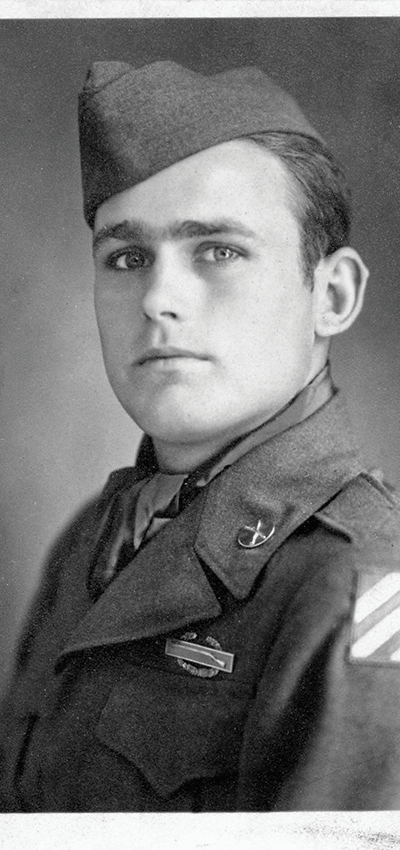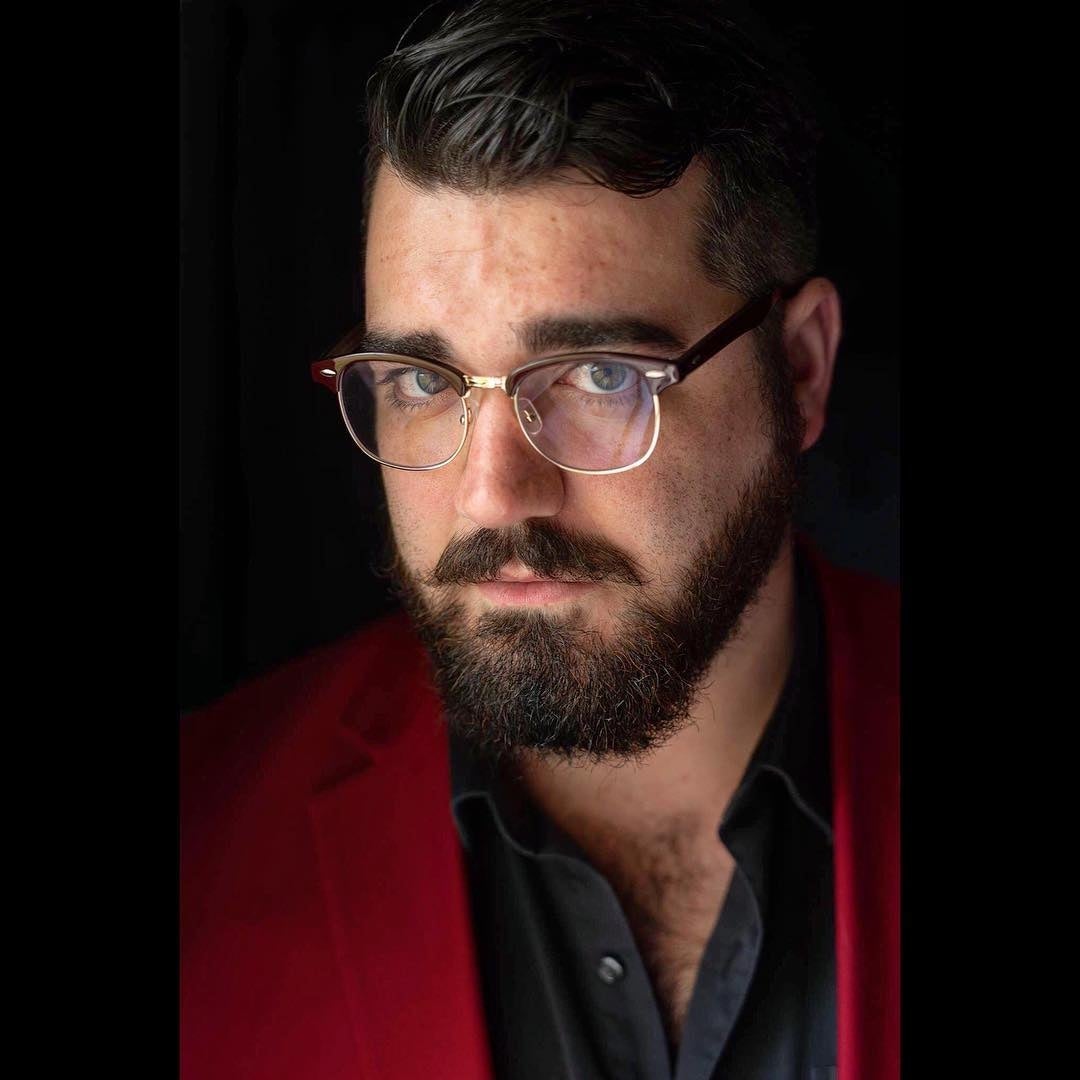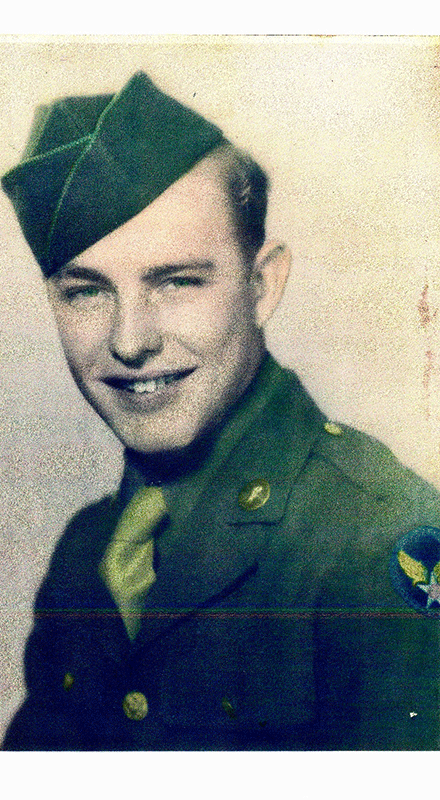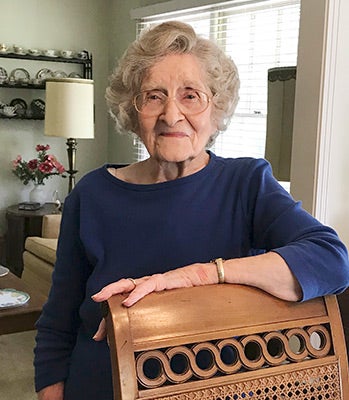Pete Lowe was active in Europe in WWII
Published 12:00 am Saturday, June 29, 2019

- Pete Lowe during World War II. Courtesy Photo
It is my pleasure to honor another member of The Greatest Generation from our area, Winford [Pete] Lowe. Of all the WWII veterans I’ve had the pleasure to interview and write about, I’ve known Mr. Pete Lowe the longest. I will talk about that a little later.
Winford [Pete] Lowe was born Feb 2, 1926, in Loango, Al, not 2 miles from where he resides today. His parents were Bethel and Evie Lowe. They had 10 children in all.
Pete attended Red Level School through the 10th grade. At that point, his father took him out of school to help him farm. Pete said that his Dad needed the help but the primary reason was that he felt that Pete was less likely to be drafted if he was helping on the farm. It didn’t take long for that to be proved wrong as Pete received his draft notice shortly after dropping out of school. When he reported for induction, the officer asked Pete, “Army or Navy?”. Pete said, “Navy”. The officer said, “Then Army it is”. Pete later learned that the induction center had been asked to supply 100,000 new replacements to be sent to Europe after basic training.
His basic training was done at Camp Wheeler near Macon, Ga. Training was supposed to be 16 weeks, but at 15 weeks, his group was placed in Army units and sent to Europe. Pete joined the 30th Infantry Division which was a part of the 3rd Army. Transport to Europe was aboard converted cattle ships, which could only carry around 3,000 soldiers. While the ship’s quarters were not on a par with other troop transport ships, Pete remembers that the Navy food was good. The convoy that they were a part of arrived safely in Europe at the port of Le Harve, France.
There was no immediate fighting near their debarkation point, but they boarded trucks and were taken to “the front”. Pete doesn’t remember if that area was in France or Germany but they shortly found themselves fighting through Germany. There were many battles and skirmishes that his division was involved in, but the one that sticks in Pete’s mind was the battle around Nuremburg. Pete normally carried an M-1 rifle but occasionally he was asked to take over a BAR [Browning Automatic Rifle] when the original operator was shot. The town of Nuremburg had been reduced to rubble by repeated allied bombing but Pete and his Division found themselves fighting door to door.
At war’s end, Pete found himself in Salzburg, Austria. He was standing guard duty at his post when someone came up to him and said, “The War’s over.” Pete was unable to join in the celebration because he had to remain on guard duty.
One memorable guard post that Pete remembers was near Vienna, Austria. He was assigned to guard the world famous Lipizzaner stallions for a period of time.
While Pete remained with the occupation army in Europe, his Dad back home had heard rumors that the 3rd Infantry Division was being made ready for transport to the Pacific in preparation for the invasion of Japan. His Dad, who was not well, went to the Red Cross and asked to have Pete returned home with a “hardship discharge”.
Late that summer of 1945, Pete was notified that he was being returned home and discharged. On his return home, he was carried aboard a “small ship” that sailed by itself and landed in New York City. He said that there were no welcoming crowds when they arrived back in the states.
He went home to Loango and was determined to graduate from high school. The Army paid for Pete to attend a school in Andalusia and obtain credits for him to graduate from Red Level High School in 1947 [possibly 1948].
As a part of the GI Bill, Pete was able to attend an accounting school in Andalusia. That school was among many of the “business schools” contracted to teach skills to returning veterans. The school that Pete attended was located in a home on Oak Street in Andalusia and operated by Edwin Patterson. It lasted 14 months and Pete received a diploma in 1949. That year he married Mary Hudson, from Opp. They had 3 daughters: Patricia [Gatlin] in 1951, Rebecca [Shearer] born in 1956, and Angela [Patton] born in 1957. Mary died Jan. 2013.
After graduation, Pete began work with Camellia City Dairys headquartered in Greenville, Al. They also had an office in Andalusia and Pete worked out of that office, delivering milk and other products to Andalusia, Opp, Florala and Geneva.
On a personal note: that was about the time that the author encountered Pete when Pete delivered milk to the West Highland Grocery which was owned by Frank Vick, the author’s father.
In 1953, Pete left the dairy business and went to work for Cotton Ford Tractor Co. He started out in the parts department, later working as their bookkeeper, shop foreman and eventually as a salesman. He retired in 1989 after working for 36 years. He enjoyed working for the Cotton family.
When Pete worked for Cotton Ford Tractor, he and the author became re-acquainted. During the 34 years that the author farmed, he was a frequent customer of Cotton Ford Tractor Co.
It has been a real pleasure, renewing a longtime friendship with Mr. Lowe, while at the same time, writing about his service to our country.
Thank you Mr. Pete Lowe, for being a member of that Greatest Generation that helped keep our country free.




